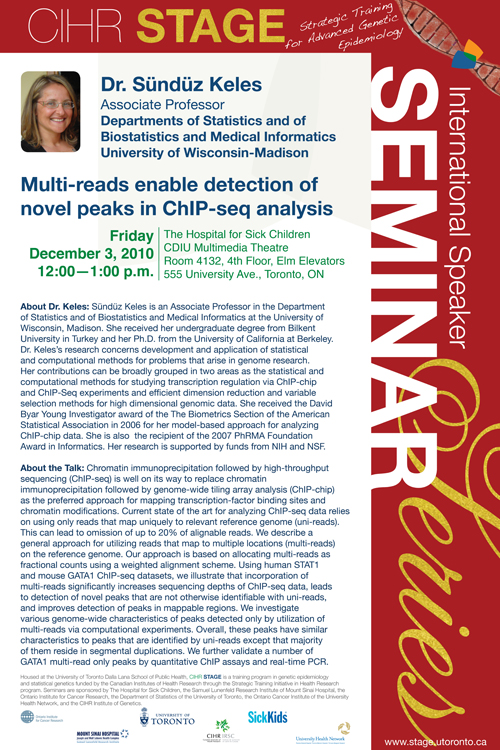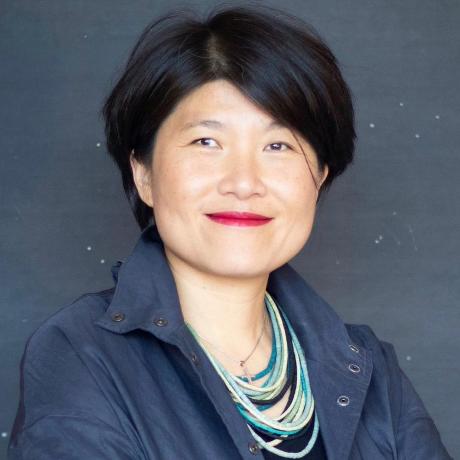
Join us for the next instalment of the STAGE International Speaker Seminar Series (ISSS) with
Sündüz Keles
Associate Professor
Departments of Statistics and of Biostatistics and Medical Informatics
University of Wisconsin-Madison
Talk Title:
Multi-reads enable detection of novel peaks in ChIP-seq analysis
Abstract:
Chromatin immunoprecipitation followed by high-throughput sequencing (ChIP-seq) is well on its way to replace chromatin immunoprecipitation followed by genome-wide tiling array analysis (ChIP-chip) as the preferred approach for mapping transcription-factor binding sites and chromatin modifications. Current state of the art for analyzing ChIP‑seq data relies on using only reads that map uniquely to relevant reference genome (uni-reads). This can lead to omission of up to 20% of alignable reads. We describe a general approach for utilizing reads that map to multiple locations (multi-reads) on the reference genome. Our approach is based on allocating multi-reads as fractional counts using a weighted alignment scheme. Using human STAT1 and mouse GATA1 ChIP-seq datasets, we illustrate that incorporation of multi‑reads significantly increases sequencing depths of ChIP‑seq data, leads to detection of novel peaks that are not otherwise identifiable with uni‑reads, and improves detection of peaks in mappable regions. We investigate various genome-wide characteristics of peaks detected only by utilization of multi-reads via computational experiments. Overall, these peaks have similar characteristics to peaks that are identified by uni‑reads except that majority of them reside in segmental duplications. We further validate a number of GATA1 multi-read only peaks by quantitative ChIP assays and real-time PCR
Speaker Profile:
Sündüz Keles is an Associate Professor in the Department of Statistics and of Biostatistics and Medical Informatics at the University of Wisconsin, Madison. She received her undergraduate degree from Bilkent University in Turkey and her Ph.D. from the University of California at Berkeley. Dr. Keles’s research concerns development and application of statistical and computational methods for problems that arise in genome research. Her contributions can be broadly grouped in two areas as the statistical and computational methods for studying transcription regulation via ChIP-chip and ChIP-Seq experiments and efficient dimension reduction and variable selection methods for high dimensional genomic data. She received the David Byar Young Investigator award of the The Biometrics Section of the American Statistical Association in 2006 for her model-based approach for analyzing ChIP-chip data. She is also the recipient of the 2007 PhRMA Foundation Award in Informatics. Her research is supported by funds from NIH and NSF.
Speaker Poster:

Photography Disclosure:
Photographs and/or video may be taken of participants at STAGE events. These photos/videos are for the Program’s use only and may appear on its website, in printed brochures, or in other promotional or reporting materials. By attending STAGE events, you accept the possibility that you may be videotaped or photographed. If you have any concerns, please inform us by sending an e-mail to esther.berzunza@utoronto.ca
The event is finished.
Local Time
- Timezone: America/New_York
- Date: Dec 03 2010
- Time: 12:00 pm - 1:00 pm
Location
Organizer
CANSSI Ontario
Website
https://canssiontario.utoronto.ca/Other Organizers

-
Lei Sun